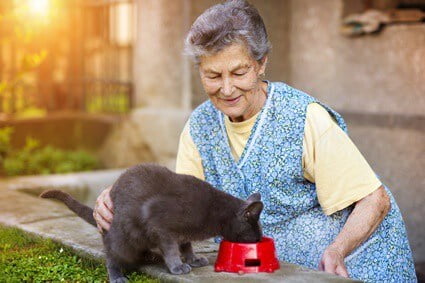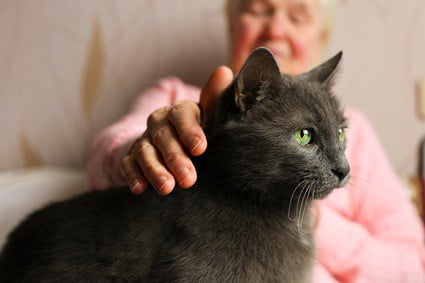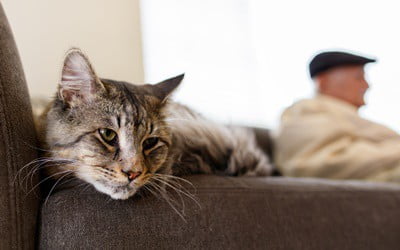We all hope that our cats live a long and healthy life, but aging takes its toll. In addition to physical concerns, a cat’s cognitive performance will start to deteriorate with age. By the time your cat reaches 15, it will be considered geriatric. It’s at this point that the signs of dementia are most likely to develop.
Feline dementia is a form of cognitive decline that’s similar to Alzheimer’s disease in humans. Your cat will undergo a series of personality changes, such as bursts of anger and aggression, confusion, and difficulty recognizing you. It will likely start soiling outside its litter box, interact less, and lose interest in play, grooming, and eating food.
Cats in cognitive decline require patience and special care. While there is no cure for this dreadful condition, spotting the signs early can improve the prognosis. If you notice that your cat’s cognitive faculties are declining, you can take steps to slow down the speed of what’s happening and improve your cat’s quality of life.
What is Feline Dementia?
This condition occurs when a cat’s cognitive functions begin to decline. As cats age, the body is no longer as supple and flexible as it once was. The same applies to the mind. Older cats will start to struggle with the basic thought processes that were once taken for granted.
Neuropathology of Feline Dementia compares cognitive decline in cats to Alzheimer’s disease in humans. In fact, feline dementia is considered a research model for this ailment. This provides some idea of what to expect from a senile cat.
Dementia should not normally impact cats until they age well into double figures. A cat is considered a senior from the age of 10. At this age, cats may start to show one or more symptoms of cognitive decline.
Symptoms usually become more pronounced after the age of 15. At this age, a cat is considered geriatric. 15 is the equivalent to the age of 76 in cat years. This means that some drop in mental acuity is to be expected.
Do not ignore the warning signs of feline dementia. Never write them off as part of aging. Cognitive decline negatively affects a cat’s quality of life, as well as the owners. Senile cats require more care.
Do All Cats Develop Feline Dementia?
It becomes increasingly likely that a cat will develop dementia once it reaches geriatric status. In some respects, this is comforting. Only cats that live long lives will reach an age where dementia is a concern. All the same, it will fundamentally change the dynamic between you and your cat.
The Journal of Veterinary Behavior suggests that cats can be protected from cognitive decline. This paper links dementia with exposure to excessive noise and air pollution. Due to their keen senses of hearing and smell, cats should be shielded from these elements anyway.
Senior cats act differently from their younger counterparts. All the same, do not assume your cat is just getting older—any change in behavior, especially if sudden, merits further investigation.
Diagnosing Feline Dementia
A veterinarian will usually detect signs of dementia in cats during a check-up. A vet will ask questions about your cat’s behavior and demeanor. Vets may follow the DISHA methodology to diagnose cognitive decline:
- (D)isorientation in your cat as it goes about its business.
- (I)nteraction becoming increasingly infrequent and erratic.
- (S)leep patterns growing disturbed, for both feline and human.
- (H)ousetraining being forgotten, leading to soiling outside the litter tray.
- (A)ltered activity levels and heightened (A)nxiety.
Each of these symptoms could still be assigned to other health concerns. To be certain of cognitive decline, an MRI scan will be required. This could involve referring your cat to a feline neurologist.
Signs And Symptoms of Feline Dementia
As your cat grows older, you must learn the signs of cognitive decline. Start paying attention to your cat’s behavior from the age of 10. Once it reaches 15, you’ll need to be particularly vigilant.
There are many symptoms of feline dementia that seem obvious. However, they can be confused with other illnesses or even the natural aging process. All cats undergo changes in behavior and personality as they advance in years.
Personality Changes
Your cat is likely to change in personality as it gets older. Senior cats sleep more and play less than they once did. Many older cats also become a little grumpier than their younger selves when disturbed.
All the same, do not just write off your cat’s changes in behavior as mere old age. Extreme shifts in personality can often be ascribed to dementia. Look out for the key warning signs of cognitive decline:
Mood Swings and Uncharacteristic Aggression
One of the first signs of feline dementia is a change of temperament. Often, this manifests as aggression. All senior cats can be a little cantankerous. A senile cat may take this to another level, though.
Aggression will only be linked to cognitive decline if it is unprovoked. A senior cat growing antagonistic when touched and picked up excessively, for example, may not have dementia. It could be in pain due to arthritis and rejecting unnecessary handling.
Cats in cognitive decline may hiss, growl and even attack at random intervals. These violent outbursts will be punctuated by moments of sweetness. This takes some adjustment for any long-standing feline owner. The cat can turn from purring to scratching in a matter of seconds.
Excessive Clinginess
At the other end of the emotional spectrum, we have clinginess. A cat in cognitive decline may follow you around the house, verbalizing to excess and seeking constant reassurance. Cats can become needy for many reasons, but dementia is a common explanation.
You’ll need to strike a fine balance here as senility is frightening for felines. The cat does not fully understand what is happening around it due to memory problems. This makes it your duty to provide love, comfort, and support.
Heaping too much reassurance upon a cat can have a detrimental effect, though. In essence, the cat starts to believe that it has good reason to be afraid. Your reaction is cementing the idea that something unpleasant is unfolding.
Bring structured petting into your cat’s day, using this time to soothe your cat. Cats with dementia often forget their routine, so this will take time and patience. The more you retain a schedule, the likelier it is to be remembered.
Lack of Engagement
Cats with dementia lose interest in anything and anybody. The cat will likely spend prolonged periods of the day hiding. Senile cats have no interest in play. The cat may even cease activities as watching birds from a window.
All senior cats start to slow down a little. They should be coerced into play if only to keep their weight under control. Senile cats start to become completely disengaged.
Lack of Grooming
A cat in cognitive decline may also lose all interest in grooming. A greasy and matted fur coat is always a cause for concern in cats. Again, there are many reasons for a cat to cease grooming. It may be struggling to do so due to limited mobility or obesity. A cat with dementia will forget or lose interest.
Memory Loss
Alzheimer’s disease equates to memory loss, and the same applies to cognitive decline in felines. Your cat’s mind will no longer be a steel trap. Previous activities and understandings that were taken for granted will cease.
Memory loss in cats can manifest in various ways. Do not mistake an unwillingness to cooperate with a lack of cognition. Cats are stubborn, especially when they start to get older. They have long-established their own routine.

Failure to Recognize Owners
A surefire sign that your cat is struggling with cognitive decline is a failure to recognize you. Cats love and identify their owners. Current Biology explains how cats form deep bonds with their owners.
Older cats may appear to ignore you by default. This could be because the cat is losing hearing as it ages or just because it’s decided not to pay any attention. The cat is secure in its bond and will find you later. It remains possible that your cat no longer remembers you, though.
Call your cat’s name when you first enter a room. Cats distinguish humans by their voice, not face. Your cat should react to your voice, even if just a little. Its ears should prick up, or the tail swish.
You’ll know if a cat recognizes you by its body language. Cats that know you have a high tail that’s curled like a question mark. A low tail denotes apprehension and anxiety, suggesting uncertainty of who you are and if you can be trusted.
Eating Less
It is rare for a healthy cat to forget to eat. Most felines build their daily routine around meals. However, cats in cognitive decline will struggle to recall their schedule. If necessary, lead your cat to the meal and offer praise for eating.
Eliminating Outside the Litter Box
Litter training is one of the main things that cats with cognitive decline forget. Veterinary Sciences discusses how house soiling becomes increasingly frequent in cats aged over 11. Initially, this may be due to restricted mobility and incontinence, but dementia plays a sizeable role.
Make it easier for a cat to use its litter tray. Place several trays around the home, clearly identifiable by scent. The cat may connect this aroma with elimination. Even cats with dementia retain instincts in the recesses of their mind.
Confusion And Disorientation
In addition to your cat’s memory loss, it may start to grow increasingly confused and disoriented. This will differ from the normal, seemingly inexplicable, feline behavior that you’ve observed throughout your cat’s life. Your cat will act increasingly oddly, potentially growing distressed while doing so.
Staring into Space
Cats in cognitive decline often stare into space, sometimes for hours on end. Equally, your cat may fixate on a wall or other uninteresting locations. It will sit for a prolonged period as though in a trance.
Note that this is different from looking out the window or staring at a fish tank. In these instances, the cat is being stimulated by movement and colors. Staring into nothingness will only occur with cognitive decline.
Entering and Leaving Rooms
Another sign that your cat is confused is entering a room and then leaving again. When it arrives, it forgets why it came. The cat may walk in circles a handful of times before exiting the room.
Cats in cognitive decline also have ever-changing demands. A cat may scratch and yowl at the door, requesting it is opened, and then walk away. This behavior is not unique to dementia. Some felines do this to display dominance.
Getting Lost
Your cat will struggle to remember common paths and routes. This includes inside the house and out. A cat in cognitive decline must be kept indoors as the outside world is far too dangerous. Unfortunately, the home can also become an unfathomable labyrinth, though.
It will become commonplace to hear distressed vocalizations. The cat has found itself in unfamiliar terrain, unsure of where it is. This is not the case. The cat just has forgotten the layout of the home. It feels as though it is in a strange house where it doesn’t recognize anything.
Reversed Sleep-Waking Cycles
The cat will doze throughout the day and come to life at night. At first, this may be difficult to identify as senior cats spend most of their day asleep. Simply sleeping more is not an immediate sign of cognitive decline. It becomes more likely if the cat is also avoiding any contact with you.
Distress at Night
A cat with dementia will likely become vocally distressed at night. This is an extension of the enhanced anxiety that your cat is experiencing. This is magnified when the cat is active after dark. The problem manifests because:
- Its eyesight is failing, and it’s frightened by the darkness.
- The cat is hungry and cannot remember where to find its food bowl.
- Sleep training has been forgotten, and the cat demands immediate attention.
- There are other pets in the home, and the cat is upset by their presence.
Do your best to reinstate sleep training. Also, take steps to keep your cat calm at night. Use calming scents, such as lavender or frankincense. The Journal of Feline Medicine and Surgery also recommends the use of Feliway.

Caring for a Cat with Dementia
If your cat has been diagnosed with dementia, it will need particular care. Steps to take to make your cat more comfortable include:
- Multiple litter trays in numerous locations
- Reliable, unchanging routine
- Assigned territory and quiet areas for resting
- A healthy diet and exercise regime
- Regular reassurance – without making the cat feel it has something to fear
Most importantly, you will need boundless patience. The cat does not understand what it did wrong. You will just add further anxiety to a feline that is likely already distressed.
Can Feline Dementia be Cured?
Sadly, there is no cure for feline dementia. The best that any owner or vet can do is slow down the decline with a combination of medication and lifestyle changes.
Selegiline hydrochloride is sometimes prescribed to cats experiencing cognitive decline. This compound is found in the drugs Selgian and Anipryl. As per Topics in Companion Animal Medicine, Selgian and Anipryl have also been found to slow cognitive decline in dogs, but research into felines is still ongoing. Many vets will prescribe these drugs for cats.
The more active your cat’s mind, the slower dementia will take hold. Ways to achieve this include:
- Talking to your cat and encouraging conversation (use meows if necessary)
- Playing puzzle games with your cat
- Providing a stimulating environment with smells, sights, sounds, and textures
Unfortunately, there are no miracle cures, and cognitive decline cannot be reversed. Living with a cat in cognitive decline is hard, so you’ll need a great deal of patience. Remember the good times you have shared. Show your cat how much you cherish it by providing appropriate end-of-life care.


I have a beautiful female cat who is 18 going on 19 in January. She is usually very calm and very clingy, especially at night. She seems to eat regularly but often want another helping after she’s finished her regular meal. She’s not obese; in fact she looks very healthy and her weight seems to be fine. She is particualry attached to me and often follows me around the house and outdoors during the day when I’m gardening. In fact, she is sitting on my desk now as I’m at the computer, which she does almost every time I’m on the computer. She will interrupt my typing coextend her paw for some attention which I always give her.Sometimes after her evening meal, she will go upstairs and yowl while e’re still eating our dinner because I think she wants us to be up there with her. She is blessed with lots of love and attention from both myself and my partner which she seems to lavish. Is there anything in particular we should be doing to keep her healthy and happy?
Thank you. I recognise the symptoms especially fixation on a wall or corner………………..20 mins at a time, and walking round and round in circles. My dear Tilly is also collapsing and struggling to stand up. she fell down the stairs recently. Is this also normal for dementia?
I do not know if this is a sign of dementia, but I had a cat that mysteriously fell down the stairs twice in his old age, and a few months later he had a full-blown seizure while sitting in my lap. After taking him to the vet we found out that he has been having “small seizures” for quite a while. We suspect that his falling down the stairs was due these episodes.
My cat is barely 10. Out of the blue she’s doing some circling at bedtime, not eating or drinking, walking in slow motion, nails don’t retract and sleeping all the time. Four months of all the physical test which showed she in perfect condition. She was given a steroid to stimulate appetite. Now she circles constantly, she was eating good but now not so good again. She rarely sleeps. Just walks constantly. She picks fights with others pets. I’m so worried about her. She don’t stop moving unless I hold her down. Rapidly losing weight again.
My older cat Iris is 9 years and 2 months old recently she started urinating and pooping outside her litter boxes for about 3 weeks now, there is another female cat that is about 4 years old. I have several litter boxes in the same area. I took her to the vet they gave her a shot for urinary tract infection, he said I should notice a change in a couple days, but she is still doing it. Is this a sign of dementia?
what do you suggest for my next move?